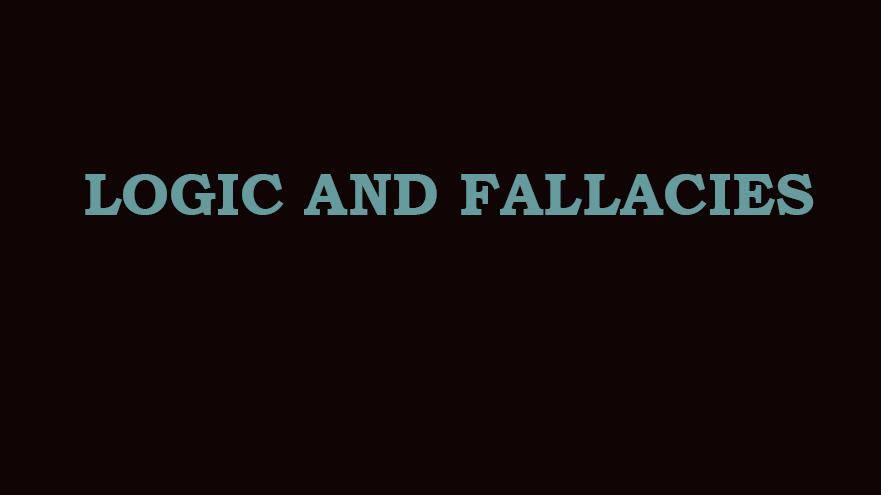
LOGIC AND FALLACIES
The word ‘fallacy’ comes from the Latin word ‘fallare’ which means ‘to deceive’. Fallacy is an argument which contains an unjustified inference or wrong assumption. If the argument is fallacious, the conclusion does not follow from the premises. In it the conclusion is ‘non-sequitur’ (it does not follow). When ‘because’ does not properly follow in the argument, fallacy occurs.
Fallacies are logical frauds which people use to push bad reasons and arguments for evil purposes. Studying the popular, informal and famous fallacies is the best way to get introduced to the subject logic. It helps one not only to avoid errors, but also to discover errors in the arguments of others. Opinions can be logical or illogical. But all social mechanisms rest upon opinion. There is difference between good, sound reasons and reasons that sound good.
INFORMAL FALLACIES
In apologetics we will be concerned more with the informal fallacies which deal with the content, than with the formal fallacies which is concerned with the structure of the argument. In the informal fallacies the fallaciousness of the argument is discernible from the content of the argument, without dealing with its formal structure.
1. Fallacy of contradictory assumptions or conflicting propositions : It occurs when two propositions, which cannot be true at the same time, are used in the argument. Eg. “What will happen when an irresistible force meets an immovable object?”. (It is a contradiction and non-sense because if the force is irresistible, then there could be no immovable object). Eg. 1. Everything is possible with God. Hence nothing is impossible with God. Can God make a mountain so big that He cannot move it? Eg. When did you stop copying in the exams? When did you stop beating your wife (husband)? Eg. Can God make square circle Or a triangle with two sides? Eg. How does the invisible man look like? Eg. If an Indian tells you that all Indians are liars, can you believe him? Solution to the problem: 1. These are logically impossible questions which are self-contradictory. Hence they are Unanswerable or complex questions. Thus every question that is asked is not necessarily valid. 2. Certain things are actually impossible for God. It is impossible for God to lie (Heb 6:18). God cannot be tempted (James 1:13). It is impossible for Him to deny His own oath (2Tim 2:13). Perfect God cannot do evil. (One must be careful in defining impossibilities to God).
2. Hasty generalization : It is constructing general rules from exceptional situations. It is moving from particular samples to general rules. It is the false assumption that what is true in a particular situation is also true under all circumstances. Such unfounded generalizations become prejudices and stereotypes based on which people judge and thus commit errors. Eg. Kumar is a Christian. Kumar is a hypocrite. Therefore all Christians are hypocrites. @ My car was stolen by a tall man. Hence all tall men are robbers. @ My wife or husband is bad. Hence all women or men are bad. @ Paul was a disciple of Christ. Paul recommended wine for Timothy. Hence all the disciples of Christ must recommend wine for the believers today. @ all Muslims are violent.
3. Reductive Fallacy : Reducing or breaking a complex concept into simple and many components and explaining the concept in terms of one of the components. It is reducing complex reality to one of its many aspects. It is the problem of over-simplification. Eg. Man is what he eats.@ Man is just an animal. @ Man is nothing but molecules. @ Flag is just a piece of cloth. @ Sign is just paper plus ink. @ God created Eve from the rib of Adam. Hence woman is just a spare rib.
4. Genetic Fallacy: It is claiming that something is nothing but its origins. Eg. You are nothing but a fetus. @ Hen is nothing but an egg. Coconut tree is nothing but a coconut. @ Is not this Jesus the carpenter’s Son?
5. Psychogenetic Fallacy : Assuming that a concept or belief is refuted simply because one has identified the psychological reason why the person held that concept or belief. Eg. Freud’s argument that God is only a psychological projection of man’s fears.
6. Faulty Dilemma : Assuming that a given situation gives only two options when in reality there are more than two options. Eg. Raju is either an angel or demon. Eg. Classifying human beings white and non-white; human and subhuman; teachable and unteachable etc.,
7. Begging the Question (Petitio Principii = Postulation of the beginning) : It is circular reasoning; using conclusion as the premise; Assuming the very thing to be proved as proof itself. Eg. Miracles never happen. Because they are impossible. Because they never happen. Eg. All experts agree with me on this question (But how do you know that those who agree with you are experts? They are experts because they agree with me).
6. Misuse of Analogy : Attempting to prove a case by an improper use of a parallel case. Here a weak case is used to prove a strong case. (Remember that analogies never prove, only clarify. An analogy is valid only if the similarities are stronger than differences). Eg. Be careful, a rotten apple can spoil the entire barrel. (The analogy compares apple with people. But one good individual can make others behave better; on the other hand a good apple cannot make bad apples good. Hence the comparison is inadequate). Eg. All pastes brighten tooth. Hence all religions are true. Eg. All rivers reach the ocean. All roads lead to Rome. Hence all religions are equally valid and lead people to heaven. (All the roads lead to Rome. But Jesus Christ is the only way to heaven). ISLAM Eg. Comparing human father with the Heavenly Father – SON OF GOD WITH HUMAN SON. Eg. Considering that the first 11 chapters of the Bible are myths. That is only a strategy to do away with the foundational truths of the Bible. If that be true the other books of the Bible which makes references to matters originally mentioned in those chapters, also would have to be considered mythical. Refer Rom 1:20; 5:14; 2Cor 11:3; 1Tim 2:13-15; Heb 11:7; 1Pet 3:20-21; 2Pet 2:5; 3:4; Mk 10:6; Isa 42:5; 43:7; 45:12, 16; Rev 4:11; 1Cor 11:9; Col 1:16; Eph 3:9.
7. Chronological Snobbery : The error of attempting to refute a concept merely by dating it. Eg. You have a stone age mentality. You have a Neanderthal attitude. You have medieval view of woman. (Age is not the criterion of truth. There is nothing new under the sun -Eccl 1:9). @Hinduism is older than Christianity. Hence Hinduism is better.
9. Argumentum ad Futuris : It is argument to the future. It is appealing to the future discoveries and evidences as proof of your assertions. Eg. The theory of evolution is right because the missing links will be discovered in the future. @ Let him steal now. IN the future he will be alright.
10. Appeal to Authority or Arrogating Experience : Attempting to refute a concept by appealing to the duration of one’s experience. Eg. Who are you to tell me that? I had been teaching theology for the last 50 years! Eg. Our teacher said that evolution is true.
11. Argumentum ad Hominem (Argument to the Man): Attacking the shortcomings of the person, rather than countering the argument. Eg. What he says cannot be right because he is a drunkard. Eg. We cannot trust him in anything, because he is an atheist.
12. Argumentum ad populum (Appeal to the people) : Attempting to prove a point by appealing to the sentiments of the people and bypassing reasoning, instead of giving relevant evidence. Eg. See, many believe in the theory of evolution. Hence theory of evolution must be true. Eg. It is right to have the atom bomb because people are for it. Eg. Destruction of the temple was right because people were supporting it. Popular opinion need not always reflect truth. Eg. The belief that earth is flat does not make earth flat. (If the people want it, then it must be right !).
13. Misuse of the media: Assuming that something is more true because it is more newsworthy or that it gets more publicity. Eg. X is better than Y, because X appears more in the media than Y. Televiso Ergo sum (I am televised, therefore I exist)
14. Appeal to Ignorance: Attempting to prove one’s position by cornering the opponent by appealing to his ignorance in some aspects. Here the absence of his evidence is considered as the proof of one’s position. It is assuming that one can win by default, and that if one’s argument is proved if the other person fails to establish his position. It is shifting the burden of proof by appealing to the ignorance of the opponent. In fact the burden of the proof is on the person who asserts anything. Eg. Since you cannot prove the existence of God, there is no God.
15. Special Pleading: It is applying double standard: one for ourselves, and another stricter one for others. We favor ourselves and prejudiced against others. It is being partial and inconsistent. We fail to apply the same standards which we apply to others. Emphasizing the material that supports your position and rejecting the material that disagrees with your position. Eg. Evolutionists give only partial evidence in support of their thesis, to the public. They do not give evidence for the transitional forms in fossils records. –missing links- Few skeletons cannot prove the theory of evolution. What they give is only their own inferences. There is no evidence of any species appearing anywhere as a result of steady transformation. On the other hand they appear suddenly and fully formed.
16. The Fallacy of Extension: It is extending or exaggerating certain aspects of the argument of the opponent and then attacking that exaggerated point. Eg. Since evangelicals give primacy to evangelism, liberals falsely accuse the evangelicals by saying that evangelicals are against social action and good works. @ prosperity theology. @ Hindus say people become Christians because of giving money only.
17. Cliché Thinking: Making aphorisms or wise sayings, proverbs, maxims etc. as the evidence of your argument. E.g. Haste makes waste, because hasty action is careless action. E.g. Silence is the sign of wisdom. Wisdom is knowing how not to know. He who knows does not speak, and he who speaks does not know.
18. Language Tricks: a. Equivocation : Using a crucial term in the argument with two different meanings. E.g. Nothing is my dog. Nothing is more important than my life. Hence my dog is more important than my life. E.g. All men are mortal. No woman is man. Hence no woman is mortal. B. Emotional Language: Using improper emotional terms in order to create a favorable state of mind. Eg. Evolutionists call creationists non-intellectuals. This is only an emotional expression, because the founding fathers of science were creationists. (Johannes Kepler, Blaise Pascal, Robert Boyle, Issac Newton, Michael Faraday, Louis Pasteur, William Thomson, James Maxwell.....C. Prestigious Jargon: Attempting to prove something by simply presenting it in sophisticated language. Egs.
19. The Ultimate Fallacy: Rejecting a proposition even when it is established by sufficient evidence. It is basically a spiritual problem. Eg. It doesn’t matter whatever be your argument. I will not change my mind. Eg. Nietzsche opined that even if Christians proved their God, he will not believe in Him.
20. Poisoning the wells: It is discrediting the source of evidence in advance so that the evidence contrary to your argument is automatically precluded. Eg. If X tells Y that Y can never have a high regard for truth, Y is denied the fair chance to state the argument properly. @ All judges are liars.. @ Foreigners should not speak …
21. Appeal to Pity: Making illicit appeal to the emotion of pity. Eg. The advocate brings the wife and children of the murderer (defendant) to the court room, and tells the jury that if you sent my client to prison, you will make a widow out of this poor woman, and orphans of these innocent children. After all do they deserve it?!



